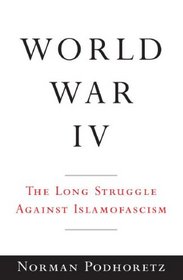Search -
World War IV: The Long Struggle Against Islamofascism
World War IV The Long Struggle Against Islamofascism
Author:
For almost half a century—as a magazine editor and as the author of numerous bestselling books and hundreds of articles—Norman Podhoretz has helped drive the central political and intellectual debates in this country. Now, in this beautifully written and powerfully argued book, he takes on the most controversial issue of our timeR... more »
Author:
For almost half a century—as a magazine editor and as the author of numerous bestselling books and hundreds of articles—Norman Podhoretz has helped drive the central political and intellectual debates in this country. Now, in this beautifully written and powerfully argued book, he takes on the most controversial issue of our timeR... more »
ISBN-13: 9780385522212
ISBN-10: 0385522215
Publication Date: 9/11/2007
Pages: 240
Rating: 1
ISBN-10: 0385522215
Publication Date: 9/11/2007
Pages: 240
Rating: 1
4 stars, based on 1 rating
Genres:
- Categories >> Kindle eBooks >> Religion & Spirituality >> Islam
- Nonfiction >> Current Events >> Terrorism
- Uncategorized >> International & World Politics >> Relations
- Uncategorized >> International & World Politics >> National & International Security




